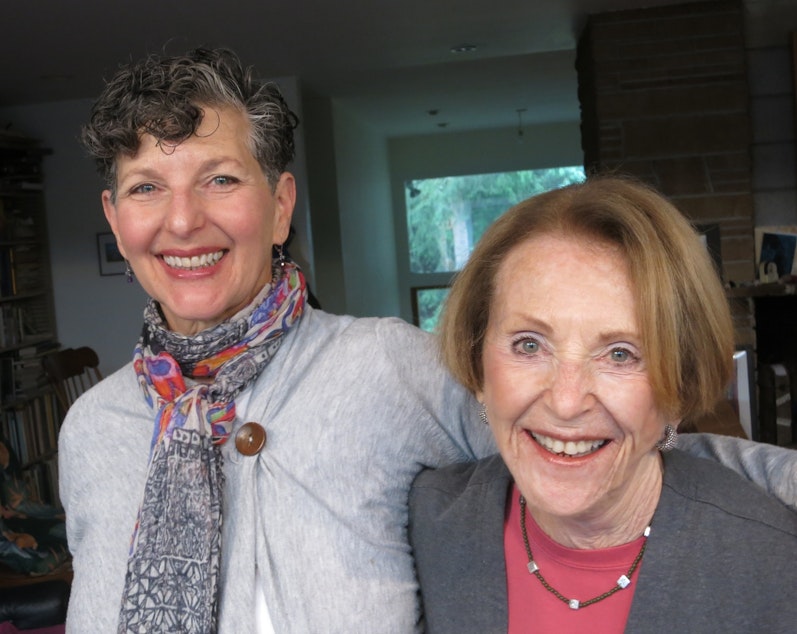What isolation can do to our brains — and our lifespans

I’d been hunkered down at home for almost three weeks when Gov. Jay Inslee issued his stay-at-home order for Washington state in late March.
Health officials had identified America’s first official Covid-19 death on February 29, and they warned the novel coronavirus could be particularly dangerous for people over the age of 60.
At 66, I wasn’t taking any chances.
I worried about my own health, but I’ve been even more concerned about my 88-year old mother, Maurine Sillman. She lives alone in a Detroit suburb.
Actually, she’s not completely alone. Her 12-year old dog Chica is her close companion.
“We were out in the backyard yesterday,” my mother says. “We let the dog next door come in, and he’s trying to make friends with her, but she’s totally ignoring him.”
In normal times my mother leads a busy life: She tutors GED students, teaches English language learners, and plays competitive bridge three or four times a week. Michigan’s shelter-in-place order has put a crimp in her lifestyle, but she’s lucky to have terrific neighbors who check on her regularly.
That’s important, because we humans are innately social creatures. That’s not just Instagram wisdom, says Janelle Taylor, an anthropology professor at the University of Toronto. It’s a foundational assumption in her field. Taylor believes our innate sociability is being tested by current shelter-in-place orders.
Sponsored
“This social distancing is showing all of us how much we rely on these opportunities to connect with people,” Taylor says. “It’s really pretty profound.”
Taylor says all of us, even introverts, need human contact to maintain our emotional and physical health. Although there are plenty of benefits to solitary activities, problems can arise when being alone leads to feelings of isolation.
Tatiana Sadak teaches psychiatric nursing at the University of Washington. Sadak says we need to pay attention to feelings of isolation or extreme loneliness.
“Same as hunger or physical pain,” Sadak says. “It’s your biological early warning machinery designed to alert you something is not right in your world.”
Neurotoxicity and loneliness
Sponsored
Sadak is concerned about seniors quarantined alone in their homes, or locked down in skilled nursing facilities. She cites a recent study on what contributes to early mortality.
Sponsored
Obesity, smoking, alcohol consumption, and diabetes are major factors, which did not surprise researchers. But Sadak says they highlighted another significant contributor: isolation.
“Loneliness and the perception of complete isolation increased the risk of early death by as much as 45%,” she says. “Loneliness and depression are neurotoxic.”
Sadak explains that ongoing serious depression can actually decrease the size of the hippocampus, the part of the brain we rely on for cognition.
University of Toronto anthropologist Janelle Taylor advises seniors---and their relatives and friends---to try to maintain regular social contacts by telephone or online digital technologies like FaceTime, Skype, and Zoom.
“The deeper issue is whether you have a network of people that’s pretty broad and robust,” Taylor says. “If you have very few connections in general, that’s what we’re talking about with social isolation.”
Sponsored
Brain engagement
I’ve been calling my mother more often to check up on her. But as the social distancing regulations continue indefinitely here in the Seattle area, and in Michigan where she lives, I notice we’re both eager to touch base more frequently, to hear each other’s voices.
We’re also consuming a lot of online cultural content: films, streaming arts performances, and a daily dose of literary content. For me, it’s part of my job as an arts reporter; for my mother, it’s a diversion from the daily uncertainty of living through a pandemic.
Taylor and Sadak both say that kind of brain engagement is integral to our overall health right now. In many ways it’s as important as eating right and getting regular physical exercise.
“Let’s focus on preventing depression and improving your immune function,” Sadak advises. “Let’s do daily brain exercises. Let’s laugh in front of a mirror. Let’s bring in meditation.”
Sponsored
Although my mother isn’t big on meditation, she’s been trying to maintain her regular activities—at a distance. She’s thinking of playing bridge online.
Sponsored
“With a robot,” she tells me.
I don’t know if she actually followed through on that, but I do know she’s reading voraciously right now. She’s also giving Marie Kondo a run for her money, cleaning out every cupboard and closet in her house.
My mom, a classical music devotee, even called recently to say she’d heard a singer named Lizzo, and thought she was “terrific.”
In her ninth decade, my mother has seen a lot and still maintains an enthusiasm and curiosity for the world around her. She’s strong and feisty; a good role model as I try to maintain my own emotional stability during the pandemic.




